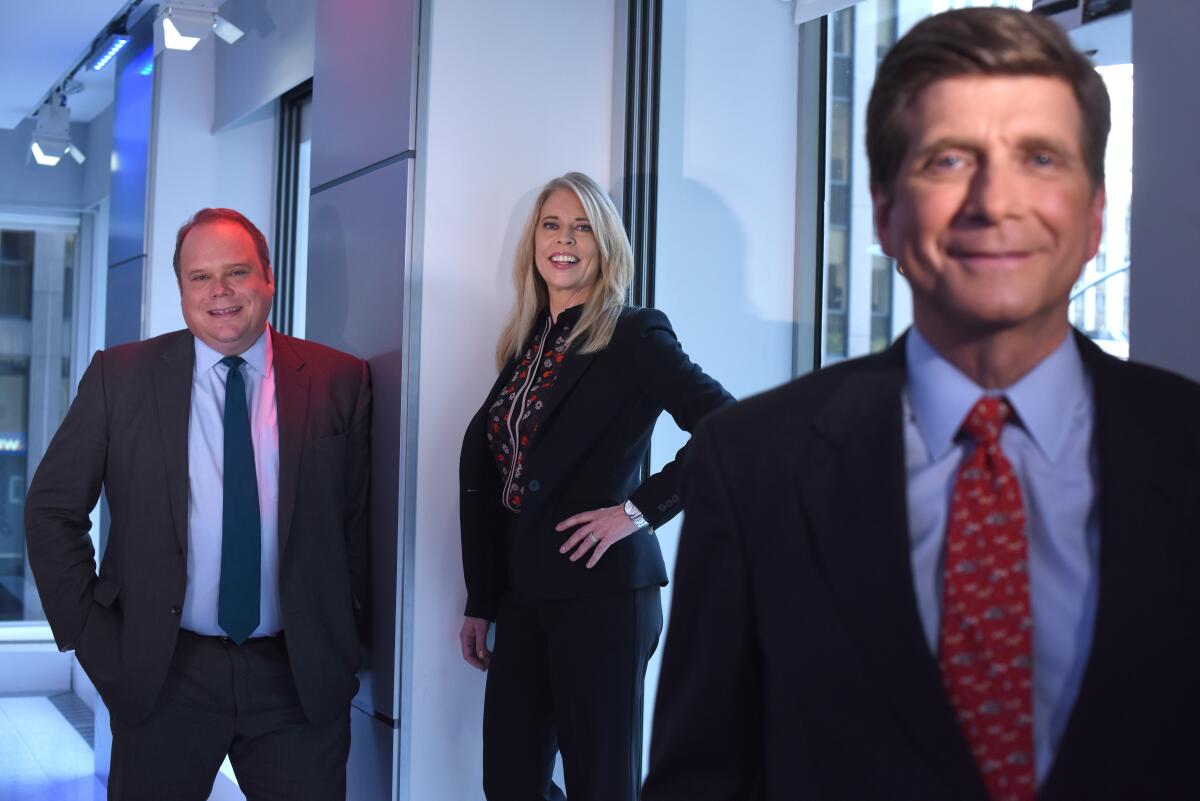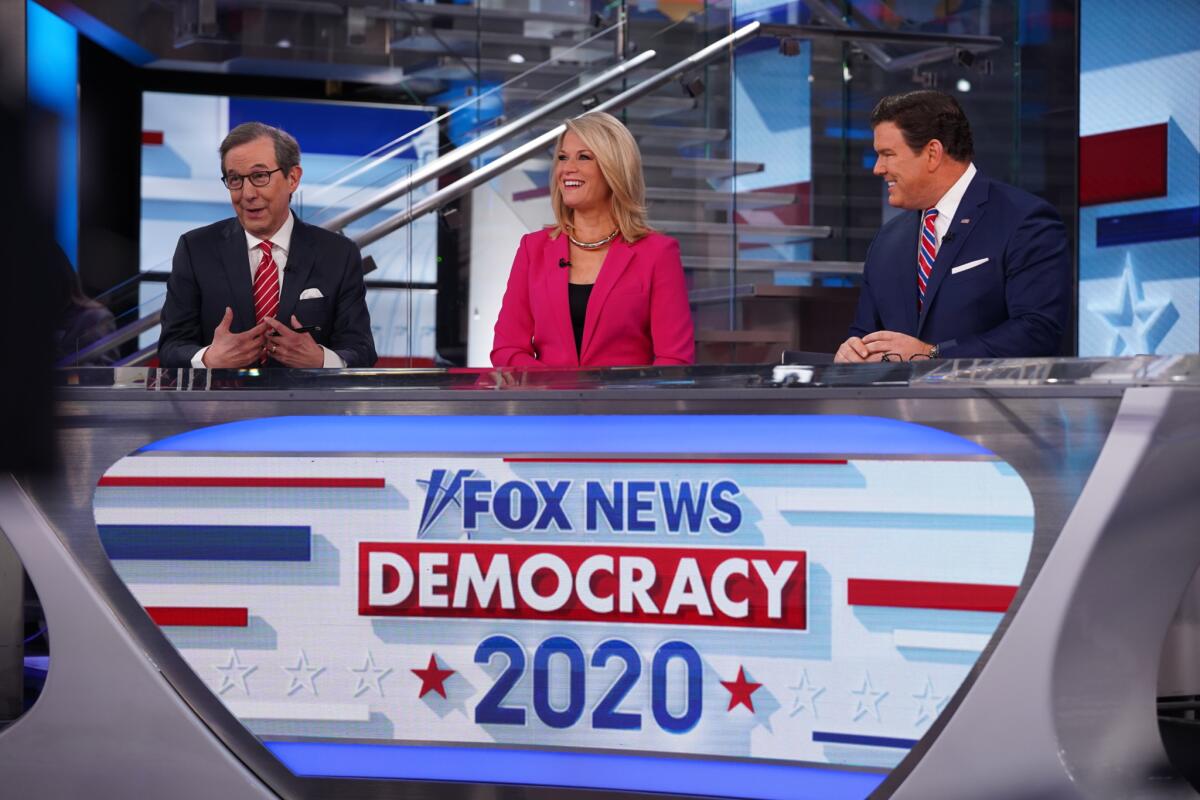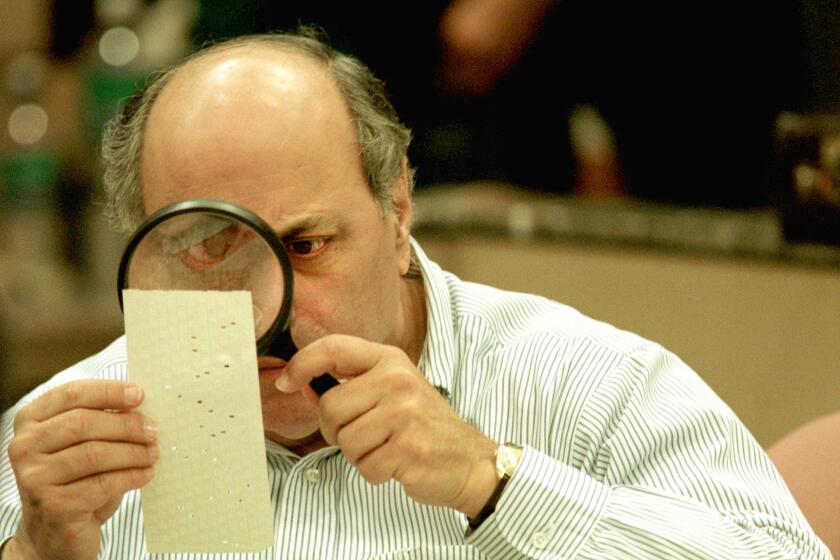Meet Arnon Mishkin, the Fox News analyst who will call the winner of the election

- Share via
President Trump has sustained himself during a challenging 2020 campaign against former vice president Joe Biden with friendly interviews and support from the Fox News opinion hosts. But on Nov. 3, he can’t count on a break from the network’s political number-crunchers, who will be in charge as election results roll in.
The Fox News election “decision desk” is insulated from the right-leaning partisan pundits on the network. Arnon Mishkin, 65, leads the group of pollsters, statisticians and political scientists who will analyze the vote count, polling numbers and historical trends and determine the winners of the races for president, as well as the House and Senate races.
The operation has a track record of playing it straight and calling races correctly — even when it’s bad news for the Republicans. (Mishkin is also involved in the Fox News polling unit, which has gotten under the president’s skin throughout the campaign as it has consistently shown him running behind Biden.)
Fox News was the first to project that the Democrats would take back the majority in the House of Representatives in the 2018 midterms. In 2012, Mishkin went on camera to stiff-arm Republican strategist Karl Rove, who disputed Mishkin’s call giving Ohio’s electoral votes and the presidential election to incumbent Barack Obama.
The top-rated cable news network has upped its election-calling game in recent years with the Fox News Voter Analysis System, a survey developed with the Associated Press and the NORC at the University of Chicago, which queries more than 100,000 people on their candidate preferences. (The AP will provide the same survey data to its member news organizations — including NPR, Univision and PBS — under the name VoteCast.)
The survey is compiled from telephone and internet responses and eschews the traditional on-site exit polling of voters that has proven inaccurate in recent presidential races. It will be tested for the first time in a presidential race, which because of the pandemic is expected to have an unprecedented number of voters using mail-in and absentee ballots instead of showing up at the polls.
Mishkin, who worked with legendary New York political consultant David Garth when his clients included the 1982 California gubernatorial candidate former Los Angeles mayor Tom Bradley, has led the Fox News decision desk since 2008. The Brooklyn-born-and-bred Yale graduate, who has two adult daughters with wife Susan Fine, a real estate developer, previously served as an editor at NBC News. Outside of his election work for Fox News, he’s a management consultant who advises media companies on digital marketing and strategy.
Mishkin recently talked to The Times about what to expect when one of the most contentious campaigns in history is decided on election night.
There are some viewers who don’t trust Fox News. Why should they trust your decision desk on election night?
I think there are two reasons. One, I think that Fox News on election nights has a reputation for being extremely accurate, and for being extremely fair in terms of reporting out the vote and the outcome of the election. Election nights are very much a function of the news division at Fox News, and every directive I have been given from management and that I feel from the culture of the place is: Every voter in America wants to know who’s won this race and why. And it frankly doesn’t matter the partisanship of that viewer — that’s what they’re looking for. The second reason is, I think, that we have developed tools for use on election night which will provide a really clear picture of what’s going on. And those tools include, first and foremost, the Fox News Voter Analysis. We believe that this is the optimal tool, particularly because the size of the sample we’re going to get for the mail-in vote.
Does the survey’s association with the AP insulate Fox from the general criticism about the point of view of the network?
Well, you know, we’ve always worked with other [networks] on election nights. I think we are really pleased with our partnership with the Associated Press, both in developing the Fox News Voter Analysis and in leveraging the vote count that the AP has been providing since the 19th century. They’ve done a very good job on election nights, and we are pleased to be working with them.
You could have Trump surrogates or even the president himself disputing your calls of states leading up to 270 electoral votes for the winner. How is that going to work — especially if Fox News opinion hosts Sean Hannity or Laura Ingraham are contradicting what you’re saying? Is that something you’ve discussed with management?
That is not something we’ve discussed. I am not part of the planning of the show. Historically the opinion hosts do get an appearance or two on election nights. But the news anchors — Bret Baier and Martha MacCallum — are really focused on what the facts are and what the numbers show. We’re focused on reporting out what those numbers show, and also what those numbers don’t show.

Will you be able to determine the results because of the characteristics of the mail-in voter?
That’s a really interesting question. Based on all the surveys, what you’re seeing is that Republicans are much more likely to want to vote on election day in person, and Democrats are vastly more likely to want to vote early or by mail. And that is very different from what has been historically.
TV networks are still haunted by how botched Bush v. Gore election night coverage set in motion the Florida recount crisis. Can it happen again?
It used to be the other way around.
Going back 20 years, mail-in voters tended to be more Republican. In recent years mail-in voters tended to be more Democratic. But it’s nothing like the differences we’re seeing today, where it’s almost like — it’s an article of faith for Democrats to say, “I want to vote early or by mail,” and for Republicans to say, “I want to vote in person on election day.” That makes our job on election night more complicated. Because in general when you’re looking at early vote returns you’re seeing sort of a random sample, and it tilts one way or the other. But it will be nothing like what we’re going to see on election night 2020, when the real question is going to be: Are we looking at election day voters or are we looking at early voters? Because it’s almost like you need to count the two piles and you can tell who wins just by the size of the two piles.
Do you think you’ll be pressed to appear on camera and explain some of these calls the way you did in 2012 when Rove disputed your call of Ohio and the election for Obama?
It depends on the outcome of the race. Before 2012, I always said, “I only get airtime when I’m wrong.” So it depends on how clear the outcome is. In terms of whether or not I get airtime, it’s fine. My goal and the team’s goal is to do an accurate job, make sure the calls are defensible, and defend them as needed if there are questions about it.
There is a lot of talk about it taking days or weeks to know the results of the presidential race due to mail-in voting. But it’s a strong possibility we are going to have results from such key battleground states as Florida, North Carolina and Ohio on election night.
That’s correct. And clearly — particularly Florida and Ohio — in the event that the president does not win those states, that is a really challenging sign for the Republicans and for the president. But to the extent that he does win those states, then that’s when you could have an uncertain outcome for several days.
How are you going to be situated due to COVID? Usually the decision desk team is packed in a small conference room near the studio at Fox News headquarters in New York.
There’s a wing of one of the floors where they have built out a space for us. Each of us is going to be socially distanced, but not that far that we don’t have the ability to talk to each other, or scream at each other. We’re within yelling distance of each other to be able to work together. And because of COVID it’s a little farther apart than we want — but also, presumably because of COVID, each of us gets our own individual airline meals.
I’m glad that there’s an upside. But are you preparing to be at the decision desk for days? Is there a rotation planned?
Our team consists of a number of external consultants — political scientists, pollsters, statisticians — who are flying in from other states. Their hotel reservations are currently open-ended, and they’re aware that this thing could go on for a while. On the other hand, the great thing about the airlines right now is there are no rebooking fees. So if it goes long or goes short — whatever, we’re prepared.
Are you feeling the pressure any differently than past elections? Do you think the scrutiny will be more intense?
There is always pressure on election night. If you make a mistake there are 325 million Americans who are going to notice. And actually more than that, because there are a whole bunch of people around the world who are going to be focused on the results of this election. So, yeah — but you always feel that pressure. It’s one of the fun things about the job.
Your tradition on election day is to take out your cello and play a Bach suite. Is that still the plan this year? Are you adding anything new to your repertoire?
I am planning to maintain the tradition. I would have to say I’ve not been able to expand the repertoire though.
More to Read
Inside the business of entertainment
The Wide Shot brings you news, analysis and insights on everything from streaming wars to production — and what it all means for the future.
You may occasionally receive promotional content from the Los Angeles Times.












